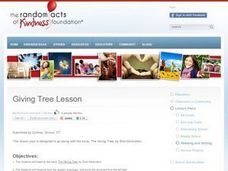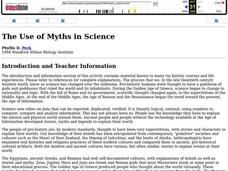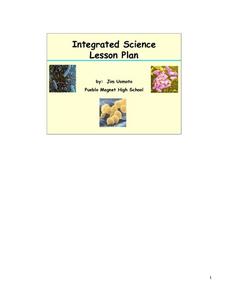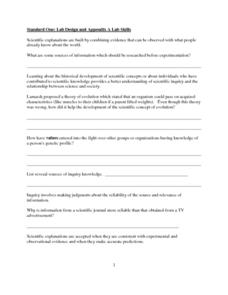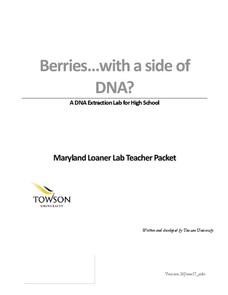Curated OER
Watching Minds Bloom
Educators can use the Principles of Bloom's Taxonomy as a Guideline for Differentiated Instruction.
PBS
Classification
Students explore classification skills used in scientific research. They classify a variety of objects in order to compare and contrast. In addition, they analyze previously collected data in order to place items into meaningful groups.
Curated OER
Giving Tree Lesson
Learners read and respond the book, The Giving Tree. In this literary unit, students listen to the story and discuss the story using Bloom's Taxonomy. Learners write a letter of empathy to the tree and observe the changes the tree went...
Curated OER
Identifying Variables
In this variables instructional activity, students are given seven experiments that they read and identify the independent variable, dependent variable, control group and standardizing variable.
Curated OER
The Use of Myths in Science
Students examine folk tales to determine the basis for scientific myths. They demonstrate through the discussion of the folk tales that the perception of the world has changed as new information is gained. They write their own folk...
Curated OER
Scientific Method Unit: Bacteria
Students discover how to apply the steps of the inquiry process through the study of bacteria. Working in groups of four, they cooperatively read an article about bacteria and complete a graphic organizer. Group members share with others...
Curated OER
Organizing Data
In this data worksheet, learners convert measurements to significant notation and determine the number of significant digits. This worksheet has 4 fill in the blank and 2 short answer questions.
Curated OER
Summer Science Recipes: Experiments on the Grill and in the Kitchen
Generate ideas about the most scientifically sound ways to prepare foods safely and efficiently during the summer season. Learners will use the GED Connection Science Workbook, so they can practice the skills needed to prepare for the...
Curated OER
Designing a Real Life Ecosystem!
Students research abiotic and biotic factors concerning the concept of an ecosystem. Record and analyze data collected. Write a lab report in proper and scientific format with thinking and analytical skills. Work as a cooperative team.
Curated OER
Science and the Scientific Process
Students investigate the characteristics of different soil samples. In this physical science lesson plan, students play the role of forensics solving a crime by matching soil from the suspect's shoes. They formulate a conclusion after...
Intel
Insects: The Good, The Bad, The Ugly
What would the world be like with no insects? Ponder this question using a research-based STEM unit that encourages scholars to investigate insects from both a beneficial and hazardous perspective. They learn about insect behaviors,...
Curated OER
Apply Technological Design and Scientific Habits of Mind
Students are introduced to the principles involved with technological design. In groups, they use the Internet to research an important historical innovation and how it changed the world. They discover the barriers that were involved in...
Curated OER
Wind Power
What a wonderful way to explore wind power! Through this lesson plan, learners get a background in the history of wind power, create their own wind turbine, and the test their designs. This is a terrific way to tie scientific principles...
Curated OER
Peanut Butter and Jelly: The Importance of Detailed Procedures
Students write a list of steps to be taken in making a peanut butter and jelly sandwich. They observe as the instructor literally follows each step. After realizing the importance of clear communication, students write a scientific...
Curated OER
Standard One: Lab Design and Appendix A Lab Skills
In this lab design and lab skills worksheet, high schoolers answer questions about experimental design including finding variables, determining controls, and graphing data. They answer questions about microscopy and label the parts of a...
Towson University
Berries...With a Side of DNA? (High School)
Is DNA still present after picking fruit or cooking vegetables? Biology scholars extract and collect DNA strands in an impactful lab. Working groups prepare their samples and compare their results to negative and positive standard...
Utah Education Network (UEN)
Simplifying Exponential Expressions
This exponential expression resource has each of the class members determine the value of given exponential expressions. They use their calculator to find the values and identify patterns. Besides writing the numbers exponentially, they...
Curated OER
Classifying Candy I
Young scholars explore the observable properties of matter. They develop two binary classification systems using concrete objects. based on two different properties of the concrete objects.
Curated OER
What Is a Species?
Students are able to recognize that scientists use different definitions of species. They are able to assess the strengths and limitations of species definitions depending on their context. Students are able to use definitions of...
Curated OER
Remembering the Challenger Tragedy
Use our nation's response to the Challenger disaster in order to teach character, as well as science and literary standards.
Alabama Learning Exchange
Animal Classification
Present information about the classification of animals. After participating in the teacher-led discussion about scientific names, small groups devise their own way of classifying everyday objects present in the classroom, developing...
Curated OER
Food Classification
Students are introduced to classification and some of the difficulties surrounding classification and how classification systems need to be able to adapt and how they may need to be changed when new information is discovered. They...
Curated OER
Flightless Birds and Scientific Research
Students study the work done by various scientists on Antarctica. In this biology activity, students play the role of researchers who must justify the importance of their study. They create a multimedia presentation about a specific...
Center Science Education
Weather in the News
Tornadoes, blizzards, and hurricanes, oh my! In this instructional activity, meteorology majors compare stories of historical storms written by two or more different sources. As a result, they understand how the media portrays such...




